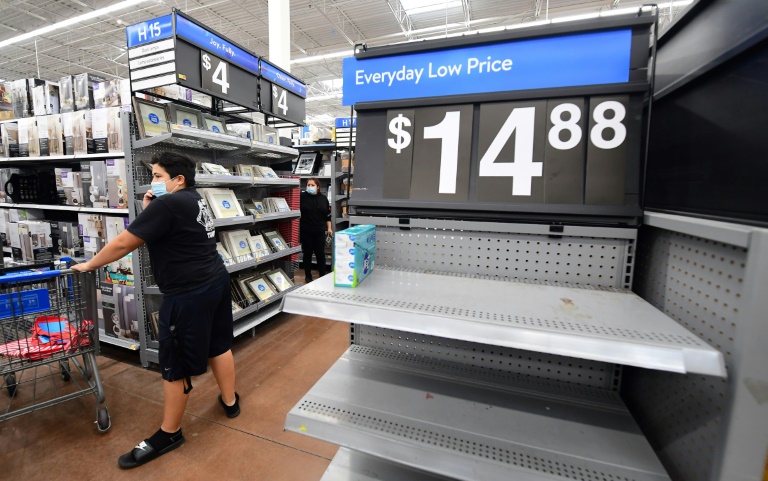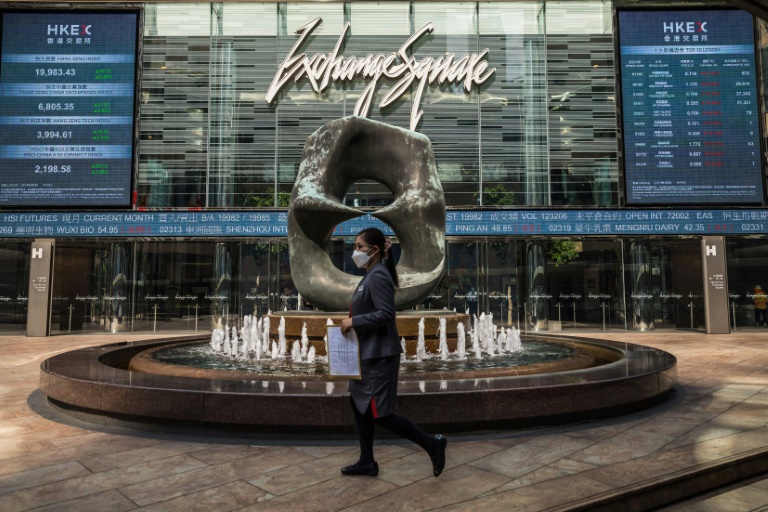Walmart reported a drop in profits Tuesday as higher operating costs dented its bottom line, while April data showed another increase in US consumer spending in spite of rising prices.
Walmart shares tumbled following the report, which comes amid rising recession worries in the wake of a 40-year peak in inflation that has prompted monetary tightening from the Federal Reserve.
Tuesday’s batch of earnings and economic data offered a mixed reading on the US consumer overall, with April retail sales still coming in at a healthy level and Home Depot shares rising following better-than-expected results.
Walmart US President John Furner said the company is seeing a “wide range” of responses from shoppers to the rise in prices.
Furner pointed to continued strong demand for pricey items such as game consoles and outdoor grills. At the same time, other consumers are moving away from brands for lunch meats, dairy and other goods in favor of Walmart’s own branded goods, which are lower-priced.
“We need to do more to control costs, to make sure we can provide good value for our customers,” Furner said on an earnings conference call.
The healthy US consumer has underpinned the strong recovery in the world’s largest economy following the slowdown during the Covid-19 pandemic, but the surge in demand also has strained supply chains and helped push inflation to its fastest rate since the early 1980s.
US retail sales rose 0.9 percent in April, boosted by a rebound in auto sales and increases in other categories, including electronics, home furnishings and restaurants, according to Commerce Department data.
“Looking ahead, consumers’ tolerance to high inflation will continue to be tested and the renewed spike in gasoline prices, along with tighter financial conditions, will weigh on households’ willingness to spend on big-ticket items,” said Kathy Bostjancic, a chief US economist at Oxford Economics.
– Labor, fuel costs rise –
Walmart reported a 25 percent drop in profits to $2.1 billion for the quarter ending April 30. That translated into $1.30 per share, below the $1.48 expected by analysts.
Revenues rose 2.4 percent to $141.6 billion.
Walmart raised its full-year sales forecast slightly but lowered its profit forecast. It now expects earnings per share to fall one percent after previously projecting an increase in the mid-single digits.
Executives pointed to a series of cost hits that converged during the period.
The company was overstaffed for part of the quarter due to the unexpectedly speedy return of workers who were afflicted by the Omicron variant of Covid-19, resulting in higher labor costs.
Walmart was also affected by a spike in energy costs when the Russian invasion of Ukraine sent oil prices soaring.
Another obstacle was a March fire that destroyed a warehouse in Indianapolis, Indiana that employed more than 1,000 people. Nobody was injured in the episode, but Walmart had to replace goods and route items through neighboring infrastructure, adding cost.
Walmart Chief Executive Doug McMillon said the company’s vast array of goods can help in an inflationary environment because it is able to offset higher prices for food and other staples with lower prices elsewhere in the store.
“Customers are even more price sensitive now,” he said. “So when you bring something down in sporting goods or hardware, one of these other category, they notice even more than they would have noticed before and that makes the elasticity impact a bit different than it would be otherwise.”
– Investing in homes –
Walmart’s results stood in contrast to Home Depot, which raised its outlook after reporting that first-quarter profits rose 2 percent to $4.2 billion on a four percent increase in revenues to $38.9 billion.
Executives with the home-improvement chain saw higher sales resulting largely from cost inflation that consumers appeared to take in stride.
Propelling the spending is a strong historic trend that shows increased investment as homes increase in value, according to Chief Financial Officer Richard McPhail, who also said most of the company’s customers already have mortgages and aren’t affected by rising interest rates.
“The homeowner has never had a balance sheet that looks like this,” McPhail said. “They’ve seen the price appreciation and they have the means to spend.”
Walmart shares plunged 11.4 percent to $131.37 in afternoon trading, while fellow Dow member Home Depot rose 1.4 percent to $300.12.











